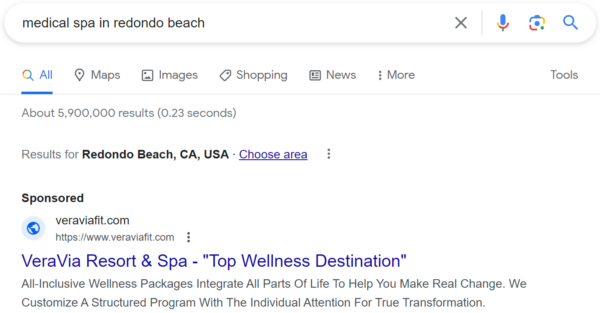PPC vs. Organic: Finding the Right Balance for Medical Spa Marketing
Medical spas are popping up around the country as the demand for procedures that address skin aging, uneven skin tone, unwanted body hair and body contouring is also increasing. According to The 2022 Medical Spa State of the Industry report, there are currently 8,841 medspas, with 90% of them independently owned.
This tight competition should signal to owners to consider working on the best medical spa marketing strategy, specifically for the digital space. While there are many channels to promote your business, there are two primary strategies that come into play: Pay-per-Click Advertising, or PPC, and Organic Search Marketing.
NKP Medical will explain what each mode can do for your business and why combining the two will greatly improve your medical spa marketing strategy.
Understanding PPC Advertising for Medical Spas
Pay-per-Click Advertising is exactly what it sounds like it is. Whenever an internet user clicks your ad on Google Search or on the Display Network, for example, you’ll be charged for that click.
Such ads can come in the form of text, videos or images, or a combination of any or all of those. You can find them on YouTube videos, Google Search Results, across social media platforms, certain websites, and even in mobile apps.

A common PPC channel is Google Ads where you’ll find a “Sponsored” search result above organic links. It looks very similar to a regular search result but it may have other features that encourage ad viewers to take action.
Benefits
PPC is a great marketing strategy and medical spas should include it in their patient acquisition strategy. Some benefits include:
1. Immediate results
Because of its straightforward process and instant visibility upon launch, PPC delivers immediate results and, when done correctly, delivers great ROI. NKP recommends PPC as the quickest and most certain way to acquire new patients.
2. Targeted audience
PPC gives advertisers total control on who will see their ad. Using specific or related keywords, narrowing down the demographics, selecting the location, their ads will be served to a hyper-targeted audience.
3. Measurable ROI
As mentioned in the first point, PPC produces immediate results that advertisers can see in real time. So right from the get-go, you can check if your ad campaign is working well or if it needs a few adjustments. Throughout the PPC campaign you can see money spent on ads directly tie to leads and patients.
Drawbacks
But even something as effective as PPC does have its disadvantages. Some common complaints are:
1. Costs add up
The thing about paid ads is that it can get expensive. Some keywords cost more than others due to how high or low the competition is for that query. It’s best to diligently check if your keyword list is within your budget and then monitor the costs as it could change.
2. Ongoing management
Independently owned businesses, like many medspas across the country, already have so much to deal with and may not have time to monitor their PPC advertisements. Checking your ads regularly can be time-consuming despite reaping high rewards at the end of each campaign.
NKP can help you manage your PPC campaign so you can focus on your business. Contact us for a free marketing evaluation.
3. Short-term impact
Often, the positive results of PPC campaigns are short-lived. You’ll see a spike in bookings when you have a lead generation campaign on, but when it’s over, your visibility will dip. By monitoring the ROI of your PPC ads, you can make an educated decision about pausing or continuing the PPC campaign.
Making the Most Out of Organic Search Engine Medical Spa Marketing

Organic search marketing is the near-complete opposite of PPC advertising: instead of paying to be placed at the top of an internet user’s search results, you must “earn” the position. The search engines will rank your Med Spa’s website high to the extent it addresses the needs of what the searcher is looking for. Success heavily relies on website optimization and consistent content creation. Writing blogs is one of the main activities of organic marketing and will take a while to get the results you want.
You’ll often see organic content in the form of social media posts, articles and blog posts on Google Search, email newsletters, and YouTube videos. The art and science of making sure that these content types rank high on search results is called Search Engine Optimization (SEO).
Opportunities
As a supplement or alternative to PPC advertisements, you can focus on organic marketing efforts. Here are some good reasons why we recommend this:
1. Long-term sustainability
As long as a website or webpage is well-optimized, it can result in long-lasting results. A high ranking page will pay dividends well into the future. A patient may find your content insightful and convince them to book a consultation with you, or they can share it to their network and get you more leads. Great content will have great visibility.
2. Cost-effective
While building a website does cost money, content creation can be free if you do it yourself. You will have to put some time and effort writing blogs and optimizing them for search engines; to ease up the load, you can work with a digital marketing agency specialized in medical spa marketing to help you out.
NKP Medical is home to SEO experts who can bring your medical spa’s website to new heights. Check out our Medical SEO services.
3. Builds trust
Internet searchers that view websites with high-quality, and sometimes high-ranking, content tend to find them credible. They have high search intent and will actively look for authentic resources and materials that can solve their problem or inspire action.
Downsides
Organic marketing is not without its share of downsides that could make one think twice before focusing on this strategy. Medical spa owners who have no time to understand the intricacies of SEO may find it complex and frustrating. Some cons include:
1. Patience needed
Compared to PPC, it can take a while for organic content to give you the results you want. Depending on how optimized and distributed a new piece of content is, it can take a few weeks or even a year for that content to demonstrate a ROI. That’s why marketers need to create content on a regular basis. Patience will truly be a virtue here.
2. Algorithms change
Google is the world’s most used search engine, with 91.53% of the worldwide market share, leaving other engines like Microsoft Bing and Yahoo! well behind.
With that in mind, the developers of Google release frequent core updates that affect their algorithms, especially with new technologies like artificial intelligence disrupting the SEO scene.
This may leave you scrambling to keep up and adapt to these changes especially if they’ll affect your organic marketing strategy. But when you’re taking care of other things in your medspa, this can be difficult to achieve.
3. Results are not always guaranteed
It’s possible that organic marketing won’t deliver immediate results or deliver the results you want over time. Some niche sectors deal with this scenario, and they need to put more effort in their strategies.
What’s really better for medical spa marketing?
If you’re still on the fence about what to choose, why not go with both? It’s honestly the best way to go.
PPC advertising and organic marketing should not be seen as competitors but rather as complementary to each other. Having a marketing strategy that maximizes their benefits will see excellent results in the short, medium and long term and bring in your medical spa’s ideal patients you deserve to have.
NKP Medical is ready to help you create your medical spa marketing plan to give your website a boost in views, leads, and bookings. Contact us today to get started.



